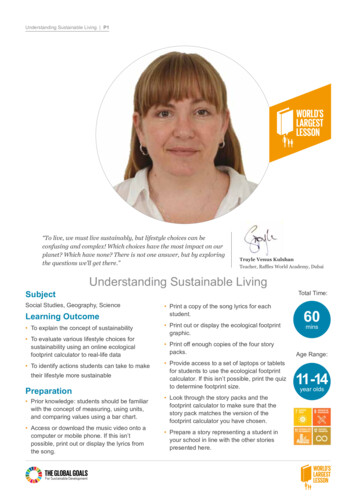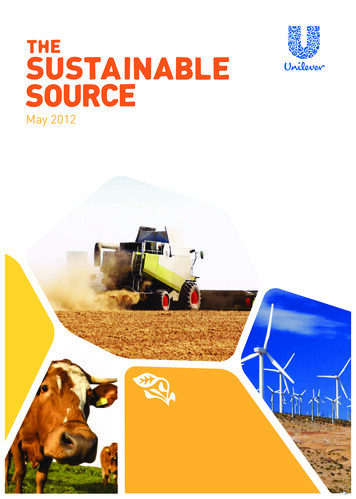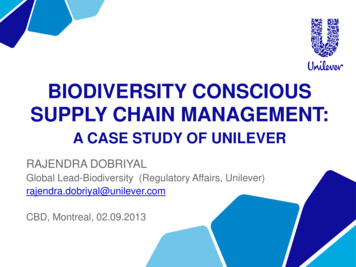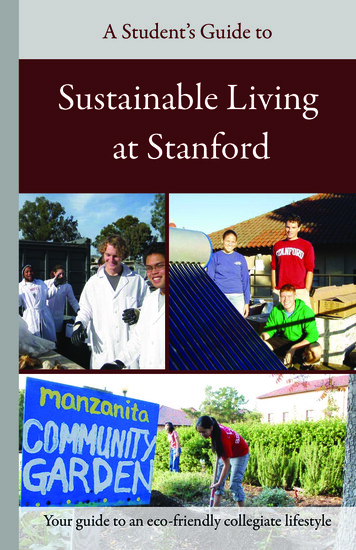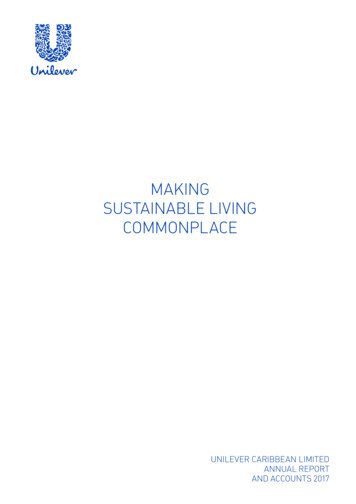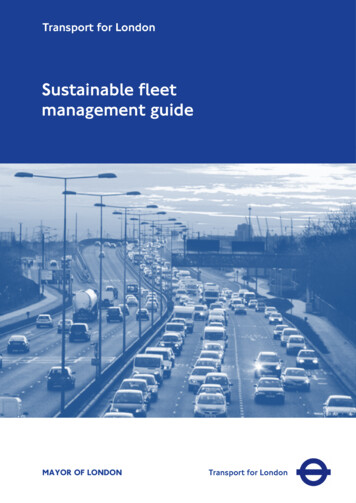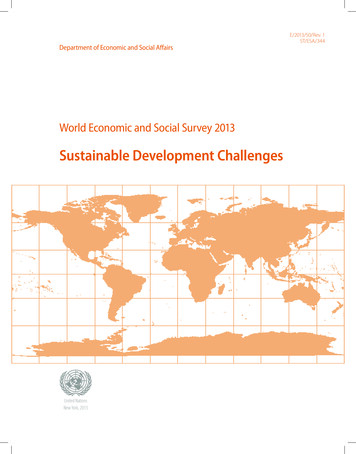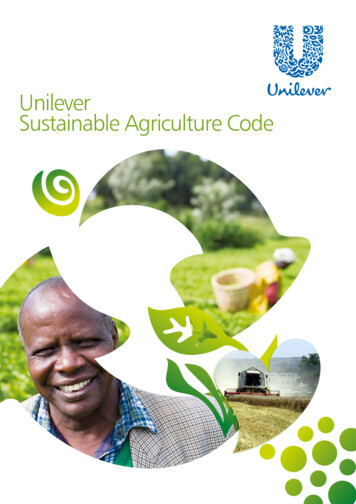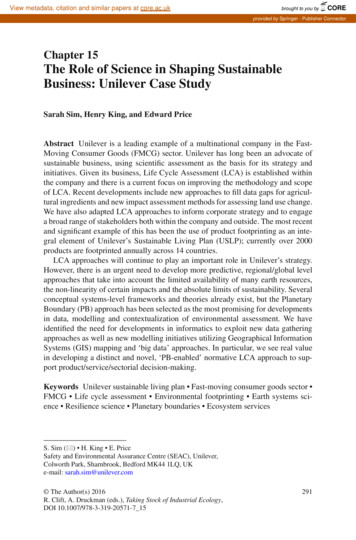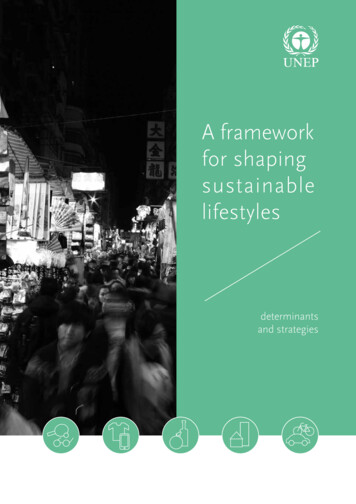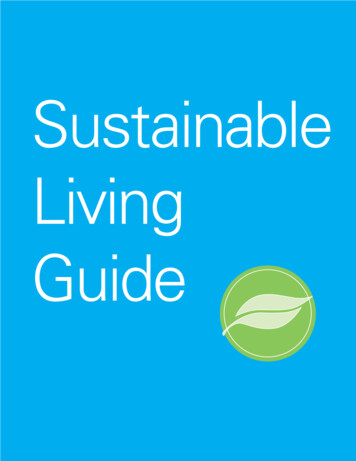
Transcription
SustainableLivingGuide
Sentinel believes that sustainability– or living “green” –is at the heartof protecting our future. Living“green” refers to the active choicesyou can make to minimize yournegative impact on the earth. Fromways to save energy and water torecycling already-used materials andactively buying reusable items, wecan show you how living “green”can even save you some “green”.This Sentinel Green Lifestyle Handbook is a room-by-room guide to yourapartment, providing ways to savemoney while saving the planet.Visit coolclimate.org/calculator to see how youcompare to similar households in the US and fordirect resources showing you how to reduce costsand usage in specific areas.
In the Kitchen Refrigeratorsshould be keptat the manufacturer’s recommended settings. When indoubt, call the managementoffice. Openthe refrigerator doorwith a purpose – not tobrowse! Aclean oven heats up quicker than a dirty oven. Thawfrozen foods in the refrigerator the nightbefore to reduce cooking time. Usethe oven light to check on food instead ofopening the oven, which causes the temperature todrop each time. Useyour dishwasher rather than individuallyhandwashing items – a dishwasher uses about ¼the energy than washing dishes by hand and savesmore than 7,000 gallons of water each year! Rinsing Turn Usemetal or paper straws. DONOT pour grease downthe sink; if you’re not interested in reusing it, then collect itin a disposable container likea milk carton, seal it and tossit in the trash. Or do a quicksearch to see if your city has acooking oil recycling program. Attendlocal farmers marketsfor fresh produce – eat healthyand also support your community.WHY? It is estimated that 50% of all greenhousegases come from meat, dairy and egg farmingmethods, so try a more vegetable-based diet. Mealplanning for the week helps reduce foodwaste.FUN TO TRY! Meal kits can bea great option if you choose anorganic company that doesn’twaste much plastic because allof the ingredients inside are fully used for each meal, reducingfood waste.dishes before loading them inthe dishwasher increases the total water and energy used. Save yourself therinsing - just scrape food off dishes.off the drying function of thedishwasher to save energy; dishes canair-dry instead. Sortyour trash so items that can berecycled are disposed of properly. Researchyour dish soap and hand soap: biodegradable soaps are a more environmentally-friendlyoption.of using plastic bags when food shoppingand purchase reusable bags. Placinga box of baking soda in the refrigerator,freezer, cupboard, etc. will absorb odors withoutharsh chemicals. Opt-out Buysilicone-based reusable storage bags instead ofplastic bags for your packed lunches. Avoidplastic water bottles by investing in reusablewater bottles and/or a water filter pitcher. Bringa reusable mug to your favorite coffee shopinstead of using the Styrofoam/ plastic cups andstraws. Usemicrofiber cloths or dishtowels instead of papertowels.Check www.greenpages.orgor www.dinegreen.com forrestaurants thatare certifiedgreen in yourarea.
In the Summer Openwindows for fresh airflow when outsidetemperatures are moderate (65 to 74 degreesFahrenheit). On high humidity days, it’s best toleave windows closed. Usefans to effectively circulate air (this works inboth summer and winter). Makesure windows and doors are closed when theair conditioning is on.Make sure there is no furniture blocking your vents.In the Living Room In the Winter Makesure windows and doors are closed whenthe heat is turned on. Makesure there is no furniture blocking the vents. Layeryour clothes and wear that fuzzy sweater! Purchasea down comforter for maximum bedtimewarmth. Coveringwood-style flooring and tile with accentrugs can help insulate your apartment.Also.EASY: Turning offjust one 60-wattincandescent bulbthat would otherwise burneight hours a day can saveabout 15 per year! Turnoff lights when not in use. Pull-upblinds during the day to take advantage ofnatural light; close them at night to retain heat andcool the air more effectively. UseLED or CFL (Compact Fluorescent Light) bulbs.WHY? Qualified fluorescent light bulbs (CFLs)provide high-quality light output, use 75% lessenergy and last 6-10 times longer than standardincandescent light bulbs, saving money on energybills and replacement costs. Consider renewable sources for furniture and décor,including cotton, wool, hemp, soy, bamboo and cork. Buy products in reusable or recyclable packaging. Sprinkle baking soda onto carpets and vacuum toremove odor from stains or spills naturally.
In theBathroom Contactmanagement immediately for anyleaks/drips around the apartment such as running orleaking toilets/faucets/shower heads.Consumer electronics play anincreasingly larger role in yourhome’s energy consumption,accounting for 15% of householdelectricity use. Many consumerelectronics products use energyeven when switched off. Unplug electronics when not in use (chargers,radios, lamps, etc.). Most electronics (phones, TVs, cameras, DVD DOplayers, computers) can be dropped off atelectronic stores for recycling. If you This helps reuse valuable material.NOT leave water running while you are brushingyour teeth or washing your face.are taking a bath, plug the drain from thebeginning and balance out the temperature as thetub fills.your showers; aim for between five and tenminutes. Supports schools, low-income familiesand non-profits in need of electronics. Shorten The demand for recycling goes up,therefore creating jobs. While Electronics may contain hazardous materials that are dangerous in landfillsand may pollute the air. Pay Manufacturing new electronics causesgreenhouse gas emissions.you wait for the shower to heat up, collectthe cold water – you can use it to water plantsaround the house.attention to the chemicals in your everydayproducts. ONLINE: Visit www.ewg.org/skindeep/ to seetoxicity ratings of regular household products. ONLINE: Visit www.epa.gov/greenerproducts toidentify greener products and services to help keepyou and your home safe. COOL: Some manufacturers offermoney towards a new item if youtrade in your old electronic device. Anatural air freshener can be made from one partwhite vinegar, three parts water and a few drops ofpure essential oil – choose your favorite fragrance.In the Bedroom Thriftstore shopping is trendy and environmentally-friendly. Swap Giveclothes with friends and family members.your old clothes, furniture and householdgoods to community organizations that will givethem a second life.Electronics
Doing Laundry Adjustthe washing machinesettings to accommodateyour specific load size; tosave water, try to wash fullloads. EASY: Washing full loads cansave you more than 3,400gallons of water each year. Washinglaundry in cold water saves energy andkeeps clothes in optimal shape and color. COOL: Switching to cold water can save theaverage household more than 40 annually (withan electric water heater) and more than 30annually (with a gas water heater). Researchyour detergent: biodegradable detergentsare a more environmentally-friendly option. Reuseyour towels and hand cloths. Whencleaning spills/stains from clothing, rubseltzer or club soda and soak in cold water.Pet Care Havinga pet in general can raise your levels ofoxytocin, a hormone that helps healing and new cellgrowth. Spayingand neutering pets is important because ithelps reduce the number of animals in shelters. Alow-carbon diet is just as important in pets as itis humans; just like us, their food (specifically beefand lamb) significantly increases greenhouse gasfootprints. Usepoultry-based foods that do not have animalby-products or artificial preservatives (often chickenand vegetable options). Userepurposed pet waste bags by usingplastic bags that your clothing, food or homeitems came in. Yourchoice in cat litter matters; traditional cat litterhas crystalline silica and bentonite clay, both ofwhich are damaging to the earth and living creatures. Corn or wheat-based litters naturally clumpand control odor while still preserving the earth. Considercarpooling with a coworker or familymember. ONLINE: check www.google.com/transit foryour nearest transit options. Bicycleor walk instead of driving wheneverpossible. Usingcruise control on freeways and highwayshelps maintain speed and save on gas. ONLINE: Check for fuel-efficient cars atwww.greenercars.org. Thinklocal when shopping! Driving longdistances for single errands consumes energy –try to consolidate your trips.Transportation
Signup for electronic bills/flyers/mail instead ofcontinuing to receive hard copies. Useyour phone for to-do lists – save paper! Buyproducts in bulk to reduce packaging waste. ASY: Stop the waste of junk mail by registering atEwww.dmachoice.org. Use ASY: Visit icited-mail-phone-calls-and-email to remove yourselffrom credit card and insurance offer lists. Recycling:reusable coffee filters such as hemp or cottonor try refillable pods rather than single-use pods. ASY: Go to www.earth911.com andEwww.greenergadgets.org to check where specificitems can be recycled near you. Download theiRecycle app created by Earth 911. Correctmistakes before printing by looking at PrintPreview. ASY: Recycle eyeglasses by visiting rce-center/recycle-eyeglasses. COOL: www.printgreener.com analyzes documentsto find ways to optimize printing. Printon both sides of the paper whenever possible.colored ink only when necessary. Try switchingto a lighter black/gray to save on ink. ASY: Soles4Souls (www.soles4souls.org) is aEgreat place to recycle old shoes. Use Tryreusable gift bags instead of wrapping paper; ortry using magazines, newspapers or scrap paper towrap gifts. COOL: Join www.freecycle.org, a nonprofit organization dedicated to helping people exchange thingsfor free – it’s all about reuse and keeping good stuffout of landfills. Each local group is moderated bylocal volunteers and membership is free.ResourcesMiscellaneous conserve-energy-future. e-reuse-recycle.php coolclimate.berkeley.edu/ www.electronicsrecycling.org www.energystar.gov/buildings/owners and managers/existingbuildings/resources your property type/energy star multifamily housing 1 www.energystar.gov/products/top 10 tips renters www.epa.gov/cfl epa.gov/recycle/electronics-donation-and-recycling www.epa.gov/watersense/start-saving www.epa.gov/greenerproducts ers www.lamprecycle.org www.slowfood.com www.vinegartips.com www.wateruseitwisely.com nergy/ thewaterproject. org/water conservation tips
Sustainable Living Guide. Sentinel believes that sustainability – or living “green” – is at the heart of protecting our future. Living “green” refers to the active choices you can make to minimize your negative i

